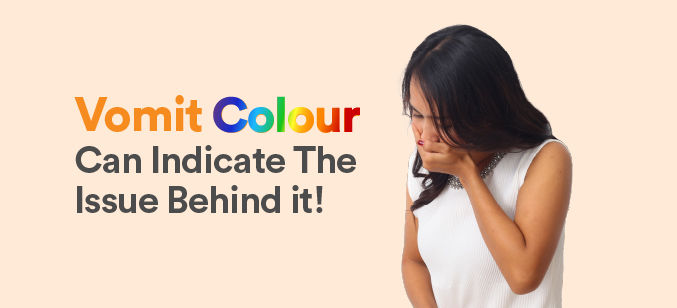Digestive Health
Yellow, Green, Black or Red Vomit: What It Means & What to Do?
5 min read
By Apollo 24|7, Published on - 31 January 2023, Updated on - 22 August 2023
Share this article
0
3 likes

While vomit is a definite sign that something is going wrong in your body, it is also a specimen whose colour, texture, and taste can help you identify the exact thing gone wrong.
That is, while a yellow or green vomit with bits of indigested food may indicate indigestion, stomach flu, or food poisoning, a clear vomit is most often the sign of gastric outlet obstruction or head injury. Similarly, while a foamy vomit may mean you have excess gas in your stomach, blood in the vomit could be a sign of slight damage to the throat or at times, indicative of more serious diseases and conditions such as peptic ulcers, amyloidosis, liver failure, or Mallory-Weiss tear.
Read on as we discuss the different causes of vomiting basis the vomit colour chart, and what to do and avoid.
What Does Yellow Vomit Mean?
Yellow vomit could be an indication that you're passing bile.
Appearance: Thin and watery consistency (may contain bits of undigested food)
Odour: Pungent
Produced By: Bile in the liver and gallbladder.
Indicates: Vomit is coming from the small intestine or stomach.
Possible Causes: Stomach flu, indigestion, a stomach infection, food poisoning, or other gastrointestinal condition.
Associated Symptoms: Abdominal pain, acidity, diarrhoea, bloating, gases, and more.
Home Remedies for Yellow Vomit
- Consume ginger, fennel seeds, and cloves to synergise the bio-chemicals that aid stomach muscles and relieve nausea, bloating, and vomiting.
- Avoid drinking sugary or caffeinated beverages, as they can worsen dehydration.
- Drink oral rehydration solution (ORS) to help replenish lost fluids and electrolytes.
What Does Green Vomit Mean?
Green vomit might be caused by an illness or an underlying gastrointestinal disease.
Appearance: Pale to dark green, thin and watery vomit. (With or without bits of undigested food)
Odour: Sour or metallic
Produced By: Small intestine or stomach
Indicates: A sign of an infection or an underlying gastrointestinal condition.
Possible Causes: Ulcer or bile duct obstruction, blockage in the bowel.
Associated Symptoms: Abdominal pain, fever, nausea, diarrhoea, bloating, gas, or loss of appetite.
Home Remedies for Green Vomit
- Try smelling peppermint to reduce nausea.
- Try sucking on hard candies, such as lemon drops or mints, to neutralize stomach acids causing vomiting.
- Drink mint tea to help treat stomach pain, nausea, and vomiting.
- Limit alcohol intake even when drinking occasionally. Avoid binge drinking.
When to See a Doctor?
It is generally advised to seek medical attention if you have severe yellow or green vomit with other symptoms that do not clear within a few days. You should also seek medical assistance right away if you have any of the following symptoms in addition to yellow or green vomit:
- Fever of more than 38°C
- Severe abdominal pain
- Feeling dizzy or lightheaded
- Vomit with blood
- A fast heartbeat
- Having trouble breathing
- Chest ache
What Does Black Vomit Mean?
Black vomit (coffee ground vomitus) is a condition in which vomit contains digested blood that has been oxidized by the acids in your stomach.
Appearance: Black or dark brown; tar-like texture.
Odour: Foul smell
Produced By: Gastrointestinal tract
Indicates: A sign of a gastrointestinal bleed (internal bleeding) or other underlying condition.
Possible Causes: Ulcer or tumour
Associated Symptoms: Sticky stools, upper abdominal pain, chronic acid reflux, black and tarry poop, and more.
Home Remedies for Black Vomit
Because black vomit is an indication of a major health problem that requires rapid attention, you can attempt the following strategies to manage your symptoms:
- Take pain relievers to aid with aches and fever.
- Suck ice chips or drink little amounts of water every 15 minutes for 3-4 hours to stay hydrated.
- Avoid spicy foods to avoid the burning sensation.
When to See a Doctor?
If you have serious rectal bleeding and black vomit, you should seek medical assistance right away. Keep an eye out for further symptoms such as
- Cold and clammy skin
- Confusion
- Continuous rectal bleeding
- Fainting
- Painful abdominal cramping
- Rapid breathing
- Severe anal pain
- Severe nausea
What Does Red Vomit Mean?
Red vomit indicates bleeding in your food pipe (oesophagus).
Appearance: Red or pink; thick and sticky
Odour: Metallic or iron-like smell
Produced By: Upper gastrointestinal tract
Indicates: Gastrointestinal bleeding, or inflammatory bowel disease (IBD)
Possible Causes: Damage to your throat, Peptic ulcers, liver failure, tear in your oesophagus or more.
Associated Symptoms: Burning or gnawing stomach pain, severe inflammation in gastritis (stomach lining)
Home Remedies for Red Vomit
If you vomit any amount of blood, call your doctor straight away, especially if it is the result of an accident. Blood in vomit can be caused by a variety of conditions ranging from minor to life-threatening. As a result, rather than using home treatments, it is best to visit a doctor.
When to See a Doctor?
If you vomited blood and are experiencing symptoms such as severe blood loss, quick breathing, dizziness or light-headedness, or hazy vision, you should visit a doctor at once.
Takeaway | Important Points to Understand
We all vomit from time to time, and it might be caused by a minor GI problem such as an acid reactivity to meal poisoning. However, it is critical to comprehend the colours as well as keep a lookout for additional signs. If this is the case, you should consult a doctor right away especially if you experience:
- Vomiting that has lasted 48 hours and is not improving.
- Unable to keep any fluids down.
- Are severely dehydrated and exhausted.
- Lost weight due to vomiting.
- Terrible chest pain.
If you have black or red vomit, you should see your doctor right away since it could be a symptom of a major health problem. Once you've been diagnosed, you can begin treatment straight away.
Warning: Always remember not to self-diagnose and take antibiotics outside of the recommended time frame.
Concerned about your vomiting?
Digestive Health
Leave Comment
Recommended for you

Digestive Health
Pancreatitis: Everything You Need to Know
Pancreatitis is characterized by irritation and inflammation of the pancreas causing symptoms that include upper abdominal pain, nausea, and vomiting.

Digestive Health
Crohn’s Disease: A Lifelong Form of Inflammatory Bowel Disease
A person experiencing abdominal pain, cramps, diarrhoea, weight loss, and rectal bleeding over prolonged periods could be affected by Crohn’s disease.

Digestive Health
Differences: Irritable Bowel Syndrome and Inflammatory Bowel Disease
IBS and IBD are two chronic conditions that affect the gastrointestinal tract or the digestive tract that runs from the mouth to the anus.
Subscribe
Sign up for our free Health Library Daily Newsletter
Get doctor-approved health tips, news, and more.
Visual Stories

Hidden Health Benefits in a Bowl of Salad
Tap to continue exploring
Recommended for you

Digestive Health
Pancreatitis: Everything You Need to Know
Pancreatitis is characterized by irritation and inflammation of the pancreas causing symptoms that include upper abdominal pain, nausea, and vomiting.

Digestive Health
Crohn’s Disease: A Lifelong Form of Inflammatory Bowel Disease
A person experiencing abdominal pain, cramps, diarrhoea, weight loss, and rectal bleeding over prolonged periods could be affected by Crohn’s disease.

Digestive Health
Differences: Irritable Bowel Syndrome and Inflammatory Bowel Disease
IBS and IBD are two chronic conditions that affect the gastrointestinal tract or the digestive tract that runs from the mouth to the anus.